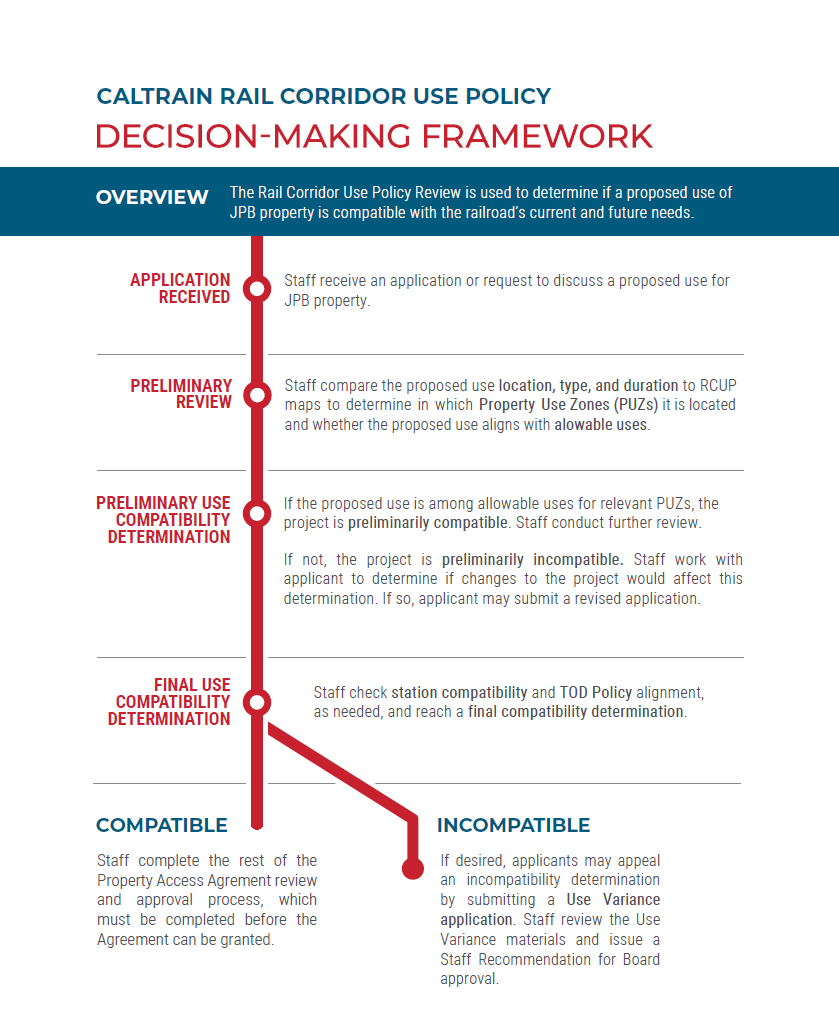The Rail Corridor Use Policy (RCUP), adopted by the Peninsula Corridor Joint Powers Board (JPB) in February 2020, is used to assess whether a proposed third-party use of JPB property is fundamentally compatible with the railroad's current and future property needs, as defined by the service vision and other adopted plans and policies.
CaltrainRCUP@caltrain.com
Overview
Proposed third-party "non-railroad use" of JPB property may include utilities, commercial businesses, development proposals, community facilities, and more. Parties seeking to use Caltrain’s property must obtain a Property Access Agreement. Short-term uses (less than six months in duration) or those requiring a right-of-entry permit initially undergo an engineering review. Whereas long-term uses (six months or more in duration) are subject to RCUP review.
If a project passes RCUP compatibility review, it undergoes further engineering, operational, and regulatory evaluations to finalize the Property Access Agreement. Once approved, the Real Estate and Property Development department issues the appropriate agreement.
A detailed overview of the decision-making process for RCUP compatibility review is below. The RCUP main point of contact will keep the applicant informed of updates throughout the process.
RCUP Compatibility Decision-Making Process
The following outlines the steps by which Caltrain staff apply the RCUP policy to evaluate the compatibility of a proposed third-party non-railroad use of Caltrain property.
1. Application Receipt. Caltrain staff receive an application or request from a project applicant to discuss a proposed use for JPB property.
2. Preliminary Review. Caltrain staff conduct a preliminary review to determine if a proposed use is COMPATIBLE with the railroad's current and future needs per RCUP guidance. This is conducted at Caltrain’s expense.
3. Preliminary and Final Use Compatibility Determination. If a proposed use aligns with allowable uses in relevant PUZs and planned capital projects, it is deemed preliminarily COMPATIBLE. It is then reviewed further, and if it aligns with Station Compatibility and the TOD Policy, it is deemed COMPATIBLE. Further detailed design, engineering and regulatory reviews are conducted after which a Property Access Agreement can be approved and issued by the JPB.
- In some cases, a project is determined to be INCOMPATIBLE with the railroad’s current and future needs for JPB property. In this instance, the applicant may choose to appeal this decision and submit a Use Variance Application. Review of a Use Variance application requires an application fee and involves further design, engineering, safety, operations and regulatory reviews by Caltrain Staff to reach a determination and identify Conditions of Approval, as appropriate.
- Projects that receive a final determination of INCOMPATIBLE are rejected. No further appeal is possible.
4. Final Review. Projects that receive a final determination of COMPATIBLE are subject to the identified Conditions of Approval (COA) issued by the JPB and will undergo final review. Upon completion of this process, the JPB can approve and issue the appropriate Property Access Agreement to the interested party.
Additional RCUP Resources
Caltrain is committed to providing resources that enable third-parties to efficiently navigate the RCUP preliminary application and use variance process. The following resources provide a detailed overview of the RCUP process, clarify instructions and details requested in the application, and are intended to help users implement the policy efficiently. If questions remain after your review of the FAQ and supporting materials, please reach out to the contact above. Thank you.
